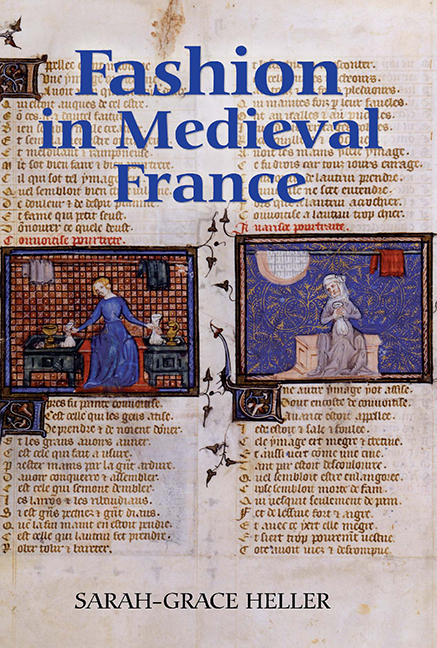Book contents
3 - Desire for Novelty and Unique Expression
Published online by Cambridge University Press: 13 April 2017
Summary
… li baron de six mille livres de terre, ou de plus, pourront faire quatre robes par an, et non plus, et les femmes autant.
Barons worth six thousand pounds or more in revenue may have four new sets of clothing made per year, and not more, and the same for their wives.
(King Philip IV of France, sumptuary edict of 1294)An important sign of a fashion system's existence is a pattern showing regular desire for new things, with arbitrary discarding of past styles in favor of novelty. This chapter examines items whose value was expressed in terms of novelty or originality, and attitudes concerning the frequency of acquisition, with a particular view to the fulfillment of criteria 1 to 5, although the others are necessarily implicated as well and will be shown to be in evidence. Tournaments stage scenes of generosity and prizes, presenting dreams of knightly novelty and distinction as well as occasions when old and worn things can be cast off. Thirteenth-century romances begin to feature scenes of changing clothes to punctuate courtly moments, as well as to signal character development. Sumptuary laws treat the desire to change clothes regularly on another social level. Negative figures embody the social scorn heaped on those who refuse to embrace regular change. This chapter examines the lexicon of novelty and distinction, and also the real forms it took, such as love trinkets, floral wreaths, close tailoring, and even military apparel. As in other sections of this book, many of the examples of novel and distinctive consumption focus on male characters, although much of the invective and criticism is directed towards women's consumption. Approaching the development of fashion in terms of expressions of the desire for novelty can offer a picture of fashion as something complexly ideological, not just a parade of dress styles.
How knights get new things
In exchange for new arms and clothing (adous noviaus), noble young men – valets as well as sons of the local barons – serve at the court of the Duke of Burgundy's daughter, Ydoine, in the romance Amadas et Ydoine (c. 1190–1220, lines 157–63). When the eponymous hero is to be knighted, the duke prepares a rich court, spending generously, knighting a hundred other young men with him and giving them all new equipment (lines 1306–49).
- Type
- Chapter
- Information
- Fashion in Medieval France , pp. 61 - 94Publisher: Boydell & BrewerPrint publication year: 2007



